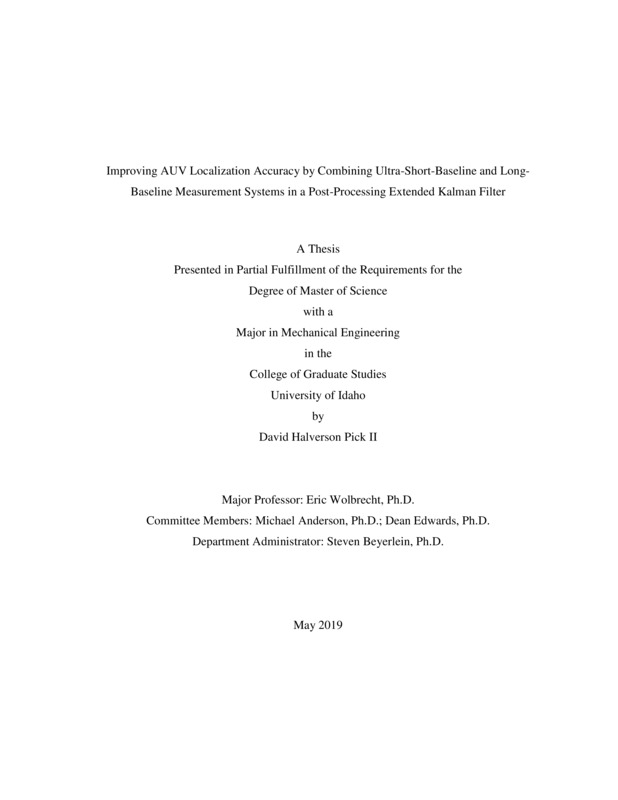Improving AUV Localization Accuracy by Combining Ultra-Short-Baseline and Long-Baseline Measurement Systems in a Post-Processing Extended Kalman Filter
Pick II, David Halverson. (2019-05). Improving AUV Localization Accuracy by Combining Ultra-Short-Baseline and Long-Baseline Measurement Systems in a Post-Processing Extended Kalman Filter. Theses and Dissertations Collection, University of Idaho Library Digital Collections. https://www.lib.uidaho.edu/digital/etd/items/pickii_idaho_0089n_11571.html
- Title:
- Improving AUV Localization Accuracy by Combining Ultra-Short-Baseline and Long-Baseline Measurement Systems in a Post-Processing Extended Kalman Filter
- Author:
- Pick II, David Halverson
- Date:
- 2019-05
- Keywords:
- Acoustic Navigation Autonomous Underwater Vehicles (AUVs) Extended Kalman Filter Localization Monte Carlo Methods
- Program:
- Mechanical Engineering
- Subject Category:
- Mechanical engineering
- Abstract:
-
The University of Idaho (UI), partnered with the Office of Naval Research (ONR), is developing the capability to perform oceanographic survey measurements conducted by autonomous underwater vehicles (AUVs). Accurate spatial and temporal localization of these measurements is essential to properly correlate electric and magnetic field measurements to the desired reference frame. Previous work at UI has investigated the use of long baseline (LBL), moving short baseline (MSBL), and hybrid baseline (HBL) for navigation and localization. LBL navigation systems can have a high degree of accuracy but have a limited operating range and are not easily re-deployed and surveyed. Field testing operations at the University of Idaho continue to expand, including consideration of ultra-short baseline (USBL) localization and navigation as an alternative or augmentation to existing LBL navigation systems due to advantages in deployability. The acoustic ranging from these systems are used in an extended Kalman filter (EKF) to estimate orientation and position. This information is utilized by the AUV to navigate along a waypoint course and stored in a log for post-process analysis and further study.
This paper presents a series of Monte Carlo simulations that were performed to compare the measurement uncertainty between conventional LBL and USBL systems. The simulated North and East position measurements from the USBL were used as additional measurements in a new post-processing EKF. This was performed in several different cases, allowing for the comparison between the legacy EKF and differing variants of a post-processing EKF using USBL measurements. Each of these simulations utilized historic UI field testing LBL range and AUV sensor measurements in addition to simulated USBL measurements.
Results from Monte Carlo simulations suggest that USBL localization uncertainty is better than that of LBL, albeit for a smaller operating range. This smaller operating range comes from poor depth uncertainty and a lack of depth telemetry. Additionally, it was found that the addition of USBL measurements to the existing EKF greatly improved the state estimate uncertainty for AUV position over the legacy EKF. USBL systems often provide a telemetry-based depth measurement, which communicates depth from the AUV to the USBL transceiver and greatly improves the uncertainty of the USBL system. When depth telemetry is implemented, the USBL has a lower uncertainty than the EKF does, but the EKF provides additional confidence in the state estimates due to the combination of independent measurement systems and the addition of the AUV kinematic model.
- Description:
- masters, M.S., Mechanical Engineering -- University of Idaho - College of Graduate Studies, 2019-05
- Major Professor:
- Wolbrecht, Eric
- Committee:
- Anderson, Michael; Edwards, Dean
- Defense Date:
- 2019-05
- Identifier:
- PickII_idaho_0089N_11571
- Type:
- Text
- Format Original:
- Format:
- application/pdf
- Rights:
- In Copyright - Educational Use Permitted. For more information, please contact University of Idaho Library Special Collections and Archives Department at libspec@uidaho.edu.
- Standardized Rights:
- http://rightsstatements.org/vocab/InC-EDU/1.0/

